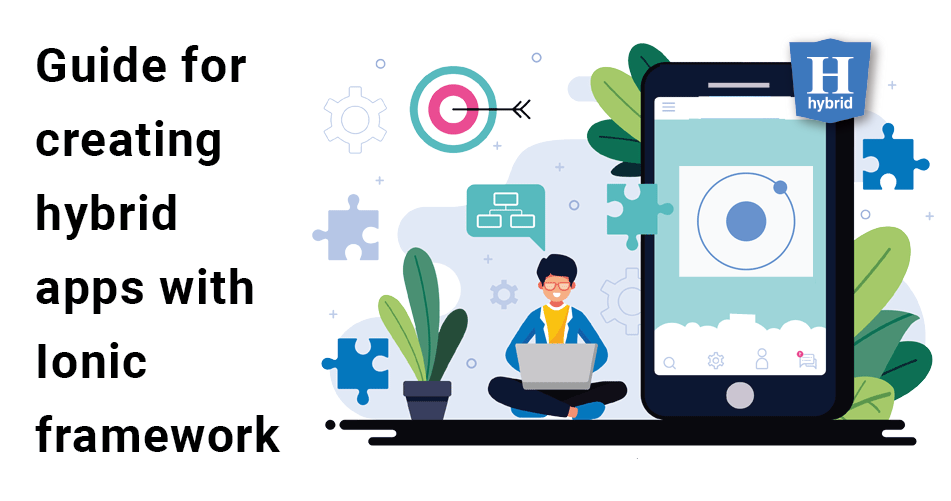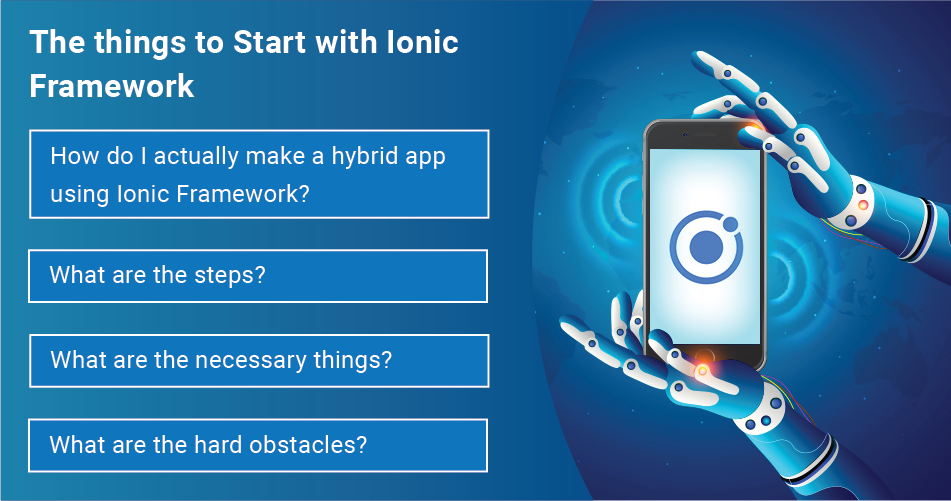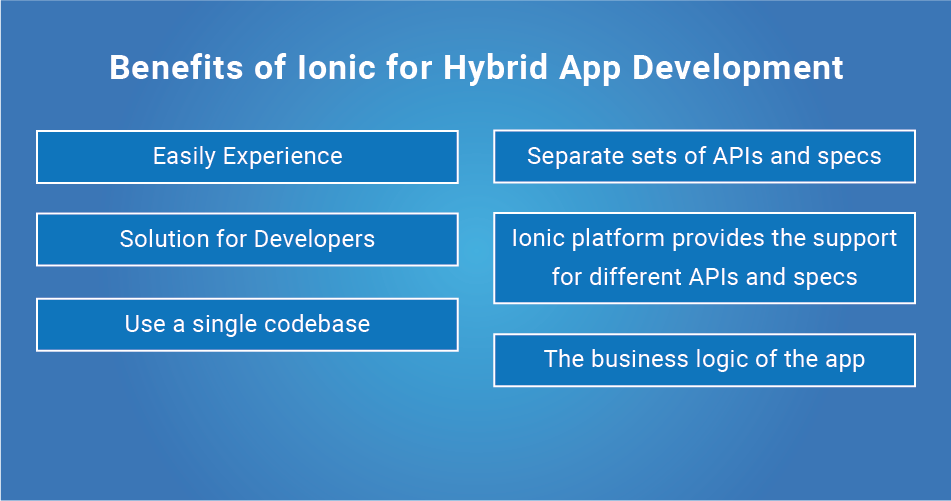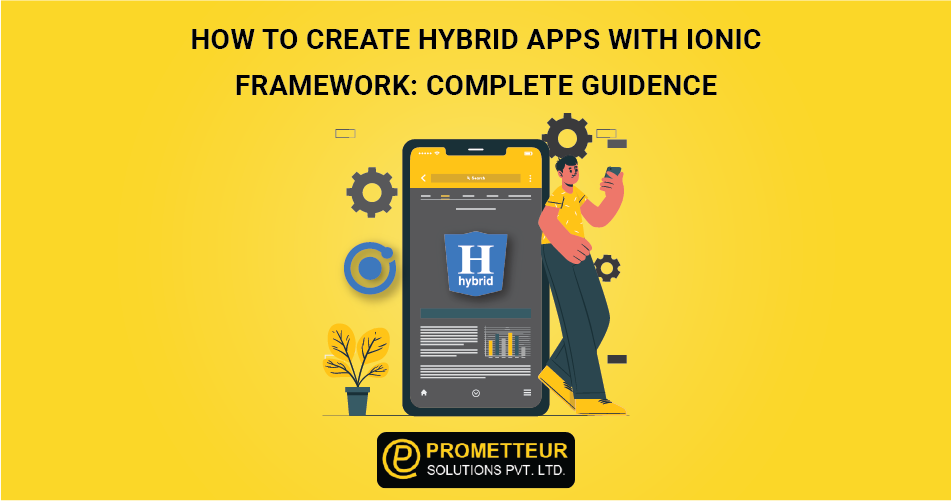Today, a number of new technologies, such as cross-platform app development frameworks Ionic, React Native, Flutter, and others, are being created, resulting in a significant difference in practice. Ionic simplifies hybrid app development by allowing you to create Hybrid Apps with Ionic Framework apps for both iOS and Android platforms with a single codebase.
Developing a cross-platform for both iOS and Android can be a nightmare. It can be expensive, difficult, and time-consuming. Yes, cross-platform app development can be hard. Trying to maintain a codebase that will work across iOS and Android can also be very frustrating. But Ionic has now made it so easy to develop cross-platform apps with its simple tools for designing mobile apps with web skills. Ionic lets you create applications for all platforms with just one codebase.

The Ionic open-source mobile framework is great for developing Hybrid Apps with Ionic Framework mobile apps. It has built-in solutions for native integration, a set of responsive widgets, a strong emphasis on fluidity, and cross-platform support. Today, with the growing demand for mobile applications, mobile app development frameworks like Ionic are becoming more important.
How to Start with Ionic Framework
Asking the right questions to lead your mobile app development is very important in getting the right product for your business. Here are the questions;

- How do I actually make a hybrid app using Ionic Framework?
- What are the steps?
- What are the necessary things?
- What are the hard obstacles?
Hybrid App development
Hybrid application development frameworks are tools that help create apps for both the web and mobile devices. This is a relatively new development because, before this, developers had to create separate versions of their app for each platform.
Hybrid Apps with Ionic Framework apps are used to build cross-platform apps. They provide a set of pre-built options for app building and provide a way to easily convert a single codebase into a variety of different outputs.
A hybrid app is an app that runs on two or more platforms, such as Android and iOS. Hybrid Apps with Ionic Framework apps can be designed with web technologies, such as HTML5, CSS3, and JavaScript, which allow for the creation of highly interactive applications. Hybrid app frameworks help developers create high-quality mobile apps without having to write the code from scratch every time they want to release an application on another device or platform.
Ionic has made hybrid app development easy for developers. They do not have to work in two different code bases or languages when building the application. It provides access to more than 150 UI components and over 20 pre-built mobile app pages that can be used for different purposes like accounting apps, eCommerce apps, and games.
1. Is Ionic app dev Different from a web page?
It works as a genuine app, not a web page; it can operate offline, and it integrates with a device’s file system. Hybrid mobile apps are often built using HTML, CSS, and JavaScript, and then wrapped in native apps utilizing specific platforms. Hybrid applications have the drawback that their performance is determined by the browser; consequently, hybrid mobile apps are typically slower than native apps.
2. Setup and Prerequisites
Step 1: Create a New Ionic App
Since you’re here, you’ve probably already thought about creating Hybrid Apps with Ionic Framework, so to create an app, we need a new app, to generate the Ionic dependencies (ng build and ionic serve), and a couple of other things that will help you build your app. Okay, so let’s create our first ionic application. If you’ve not already installed it, then please follow the following steps to install Ionic,
Step 2: Run the App in Ionic
To run your app, please open it in your browser, you’ll see a “You are running an app that you have just installed” page, and when you press the back button (Or better yet, Ctrl+G), you’ll be launched into your app. To run the app, you simply need to download and install a couple of dependencies.
3. Getting Started with Ionic
Before getting started, you will need to download a copy of Ionic, the open-source, cross-platform mobile development framework, and some other tools: Download the latest, from Ionic.io.
Copy the Ionic “nic.ionic-core”.xcodeproj to your project folder, for the current Ionic version. to your project folder, for the current Ionic version.
Open the .vscode.JSON file. This is used for allowing others to contribute to your project. The “Identity.php” file is needed to make your app appear legitimate to any other system. This is used for allowing others to contribute to your project. The “Identity.php” file is needed to make your app appear legitimate to any other system. First, you need to set a static build folder.
Benefits of Ionic for Hybrid App Development
So, as you can see, the Ionic framework does not only help in creating hybrid mobile apps but also gives several other benefits:

1. Share Your Experience Easily, Learn from Many Users in 1 Shop
As a technology consultant, you will have a chance to meet potential clients, for whom you will present a variety of mobile application examples. Ionic helps developers to do this quickly, easily and offers the potential client a one-stop solution.
Mobile application development is a complex process that can cost hundreds of thousands of dollars. It’s also time-consuming, with many different details to be taken into consideration. Developers are rarely experts in all areas of app design, which is why they often need help from other designers.
Ionic is the only platform that offers high-quality mobile app templates for developers and designers so they can create fully customized apps in minutes, without having to spend time in research or discovering new resources. Ionic will save you time and money by being your single, one-stop solution for mobile app development
2. The Best Solution for Developers
Mobile app developers have a hard time deciding which environment to use while creating their Hybrid Apps with Ionic Framework mobile apps. Ionic offers a number of different environments, but choosing the right one has been a struggle.
Ionic recognizes that developers want to complete the job quickly, and they do not want to get bogged down with making a tough decision. They also know that you need the best environment for your app’s needs, depending on what type of app you are developing.
The framework has also made it simple for developers by creating a decision tree that will help you decide which environment is best suited for your requirements. Use this handy decision tree to make an easy choice about which environment you should use while creating
Ionic has several different environments where developers can create their Hybrid Apps with Ionic Framework mobile applications. You can pick the best environment that suits your requirements, depending on what type of mobile app you are developing.
3. You can easily use a single codebase to create both native and hybrid apps
Developing apps has been a frustrating experience for decades. Building native apps require writing a lot of work while writing Hybrid Apps with Ionic Framework apps requires writing some good clean code. There are a lot of tradeoffs when developing these types of apps, and it’s hard to create a truly web-based experience.
This all changes when you use a single codebase to create both native and hybrid apps. The same codebase is used to create both native and hybrid apps, so there are no tradeoffs anymore! You can provide your users with the best user interface possible.
You can easily use a single codebase to create both native and Hybrid Apps with Ionic Framework apps so that when developing native apps, you only need to write C# code, while when developing hybrid apps, you can write Xamarin or Kotlin code. In fact, the same code is used to create both native and hybrid apps, so there are really no performance disadvantages.
4. You don’t need to worry about working with two separate sets of APIs and specs
Mobile app development is time-consuming and expensive. Developers need to constantly learn new languages and languages just to create an app for a single platform.
It’s frustrating to always be learning, relearning, and relearning again for various platforms. It feels like an eternity before you find out whether or not your app is successful.
Ionic is a framework that simplifies the process of mobile app development. You don’t need to worry about constantly learning new languages because Ionic’s framework will work seamlessly across all platforms. This makes it great for both beginners and veterans alike!
You don’t need to worry about working with two separate sets of APIs and specs if you are creating a hybrid mobile app with Ionic. This makes Mobile app development to be seamless and a framework is a great tool for developers.
5. Ionic platform provides the support for different APIs and specs from the platforms themselves
With these Hybrid Apps with Ionic Framework app development framework, you can write your application once and deploy it to both iOS and Android platforms. Save time, save money, and create better apps for your customers.
In other words, you can easily deliver your app across different platforms (iOs, Android, web) all at once with the same codebase. Stop wasting time & money developing apps separately; start using Ionic now!
The ionic platform provides support for different APIs and specs from the platforms. The frameworks simplify the development of the Hybrid Apps with Ionic Framework and provide a unique way to maintain the app across the two platforms.
6. The business logic of the app can be expressed in a way where the app is able to run as fast as possible.
Developing mobile apps is difficult and time-consuming, and we often need to deal with a huge amount of data and UI logic. The framework we use needs to be easy to write and easy to maintain. These two factors are essential for any mobile app developer. With so much on our plate already, we don’t need the extra stress of dealing with a framework that will slow us down.
We can always rely on this framework for our mobile app development needs because it’s a market-leading solution that’s both easy to write and easy to maintain. It has powerful libraries that make writing mobile applications significantly faster. And the learning curve is one of the shortest when compared to other frameworks out there.
As hybrid app developers, we need to deal with a huge amount of data and UI logic in a mobile application. So, we need a framework that will help us to develop apps that are easy to write and easy to maintain.
The ionic platform provides you with the most important components that help to build hybrid apps that are fast and easy to deploy. Some of the Ionic components are Mobile and Web view, Audio, 3D components, Security, Extensions and commands, Service Workers.
Conclusion
So, if you still haven’t learned about Hybrid Apps with Ionic Framework, or need some help in building your first hybrid app, follow the guidelines in this article. It’s important to note that Ionic itself is still a young platform, and many of the examples you will find online are not very production-ready.
They don’t use proper architecture and don’t follow some best practices when it comes to development. However, most developers and designers find it easy to pick up the Ionic framework and start making Hybrid Apps with Ionic Framework. Ionic can be described as a very lightweight app development framework, which consists of a set of modules that if utilized well, makes app development easier and faster.
